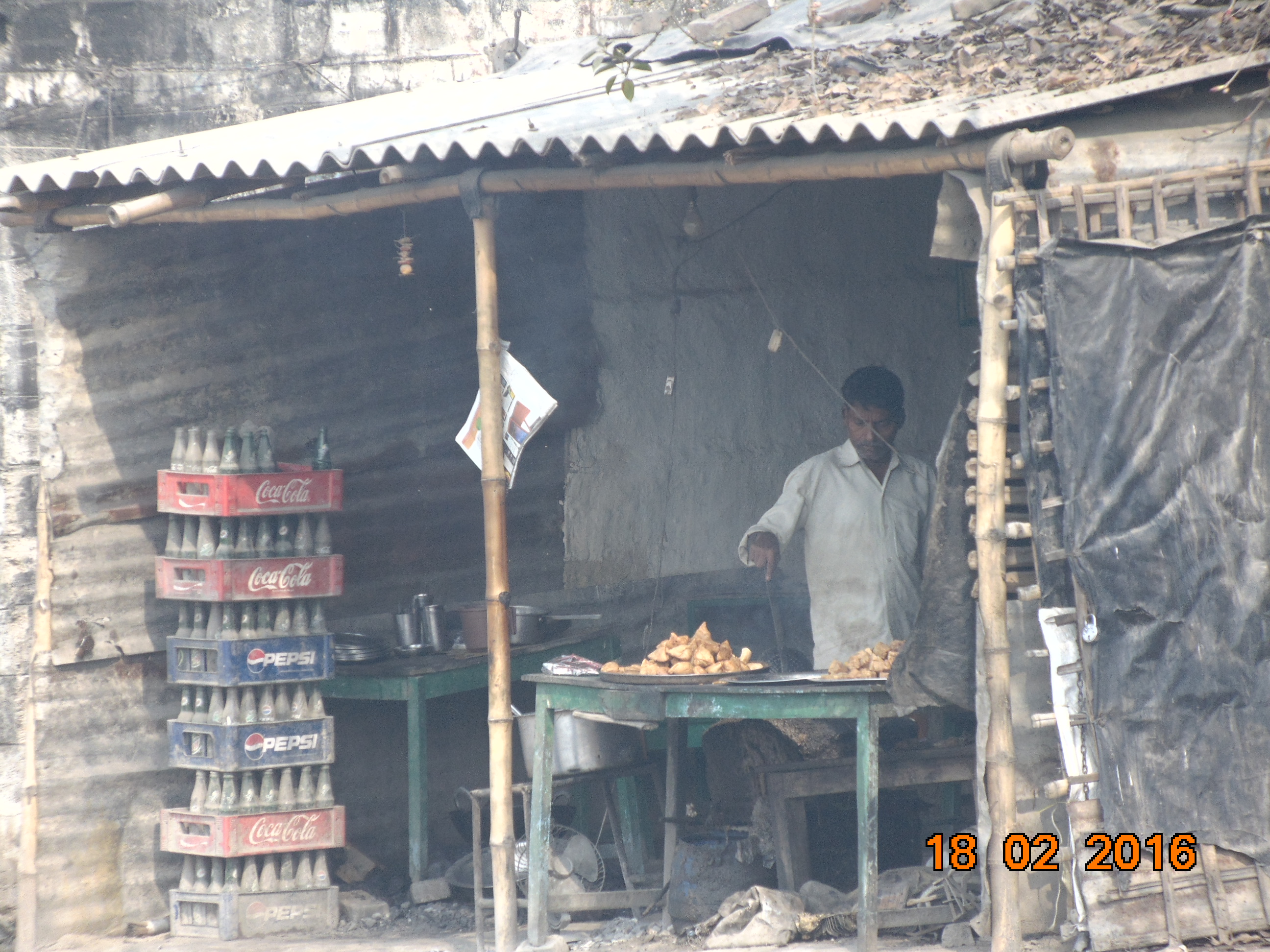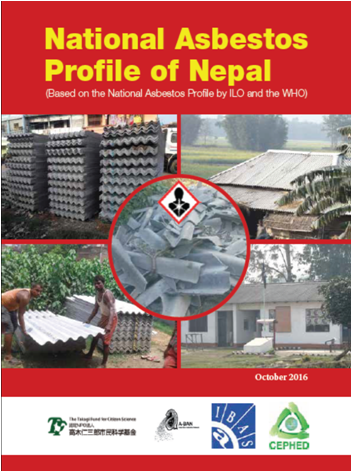Research and Awareness Raising about Asbestos in Terai Region of Nepal
 |
Center for Public Health and Environmental Development (CEPHED) |
Report"Annex 1. National Abestos Profile of Nepal"[pdf2.27MB] |
 |
Ram Charitra Sah | |
 |
http://cephed.org.np/ | |
 |
JPY 500,000 |
Research Background Final Report (abstract) Others

a Open Food shop under Asbesto Roof

National Asbestos Profile of Napal:NAP
Research Background
Federal Democratic Republic of Nepal is a landlocked sovereign state located in South Asia. About 1200 tons of Asbestos annually imported to Nepal and used mainly for roofing of houses, schools, shops etc. in Terai Region (southern plane land) of Nepal and even more specially in the eastern and central Terai of Nepal. There is some illegal importation of such materials to Nepal too. Local FM radio has been used for massive promotion of asbestos as best roofing materials not disclosing its carcinogenicity properties.
Due to large use of asbestos and mishandling of waste, there was an identified case of asbestos related Mesothelioma cancer among other cancer patients in the country is on rises and has reached up to 40,000. Additionally, there is increased exposure to asbestos as there has been massive import and uses of asbestos in Nepal, especially in the Terai Region.
First hand research on asbestos by visiting all the custom offices in Indian boarder area of Central and Eastern Teria of Nepal, acquiring real import data record of Asbestos and Asbestos containing products. Prepare & widely disseminate a comprehensive National Asbestos Profile of Nepal has been aimed. Based on this prepared asbestos profile, advocacy campaign will be carried out with local, district and national level of concerned authorities to effectively implement the government decision of asbestos ban. Some sampling of asbestos for testing its content and type, developing case story of environment degradation and public health impacts etc. has been planned. Research Questionnaire Survey with selected 50 key informants (People used Asbestos, Asbestos Workers. Retailers, Dealers, Importers, Custom Officers, Local Hospitals etc.) and their analysis will be the part of national profile.
Additionally, a massive awareness program through using mass media (FM Radio and TV) as well as social media such as Facebook and twitter etc. will be carried out to stop using asbestos.
[Sep. 2015]
Final Report (abstract)
Soon after signing the contract with the Takagi Fund for citizen Science, CEPHED has processed to get approval from the concerned government agencies to implement the project. The formal approvals for the project implementation were obtained from Social Welfare Council (SWC), Government of Nepal and support letter from Nepal Health Research Council (NHRC). Established coordination with the Department of Custom, Ministry of Finance and received a supporting letter from them and planned for the field visit. The field visits during the early project period in all 10 project implementation districts of Nepal in from central to eastern Terai were carried out, we were able to visit all the custom office, acquired available and assessable date, meet doctors, asbestos workers, government officials, asbestos dealers, retailers as well as people who have used the asbestos. Information regarding their knowledge about the health and environment impact of Asbestos was obtained. Very few awareness about the asbestos were found in the field. But some of the uses had heard about its carcinogenicity. The Custom Officers as well as workers found to be totally unaware about the health impacts of asbestos
During the field visit, we also collected some 9 samples of asbestos like substances roofing materials, clutch plates and brake shoe and get them tested in the Tokyo Occupational and Health Safety, Tokyo Japan.
The identification of asbestos hotspots like schools, colleges, government offices and waste piles were made. Potential health impacts based on official record and estimation of possible mesothelioma cancer cases based on the import and consumption of the asbestos has been made and included into the National Asbestos Profile.
One of the most important outcomes from this research is to have National Asbestos Profile (Annex 1. National Asbestos Profile) for Nepal" got published and already launched on last October 21st 2016 through organizing an interaction program participated by over 50 stakeholders representatives from government, non-government, scientists, researcher, media , trade unions, occupational safety experts, doctors etc. The profile is under wide dissemination in Nepal.
This project period was very much successful in raising awareness about the asbestos as there was number of media coverage on asbestos issues in national as well as English language in addition to our own sponsored dedicated radio jingle even in local language continue to be broadcasted from local FM radio station as well as Television News Reportings. People are found to be very much benefitted from all those media outreach. The project experiences has been also shared at different international forum like OSH Strategy meeting at Dhaka , Bangladesh and also received international media out reaches as our project brief and updates has been published in newspaper from Dhaka, included in ANROEV OSH Newsletters.
During month of April, a Japanese expert Mr. Sugio Furuya from Tokyo Occupational and Health Safety, Tokyo Japan visited Nepal and our CEPHED Office and had participated in series of meeting with concerned Government officials from ministry of environment, Prime Minister Office and Trade Union Office like GEFONT. During his visit we also able to meet some asbestos workers at Brake shoe lining shops, tool some dust and asbestos sample as well as also seen some alternative substitute of asbestos roofing materials as well. The result of those samples were also received and already included into the published National Asbestos Profile.
His visit and meeting with concerned government officials leads to special outcomes of our project as Prime Minister Office exclusively wrote a letter to Nepal Reconstruction Authority for not to use any asbestos containing materials in post disaster reconstruction of Nepal along with the directives of effective implementation of the government banning decision and planning for the complete elimination of Asbestos from Nepal.
With the implementation of the project, the implementation of the government asbestos ban decision is getting forward, awareness among the local people in the project area have increased, national asbestos profile is in place, number of media outreach at national and international level. So this project is not only benefiting the people at project implemented districts of Nepal, but Nepal as a whole nation, increased response from government towards effective implementation of their decision, also able to influence in the south Asia regional and international level through engaging in Rotterdam Convention on Prior Informed Consent (PIC) as well as Strategic Approach for International Chemical Management (SAICM) process.
Others
The work of CEPHED and its executive Director Mr. Ram Charitra Sah in the area of protection of public health, environment conservation and chemicals safety including asbestos related research and awareness etc. has been well recognized by the Government of Nepal, Mr. Sah has been honored with the Environment Conservation Award 2016 from the Prime Minister of Government of Nepal on June 5th 2016.
With the successful completion of the project and blueprint of the National Asbestos Profile of Nepal produced, launched and disseminated during the project period already started influencing the government future course of action towards effective implementation of the government banning decisions is the utmost goal of this project. We are expecting more and more positive outcomes and am sure that this project help government to ensure effective implementation of the Government`s asbestos ban decision as well as playing a vital role in protecting and preserving public health and environment of Nepal.
[Dec.2016]
